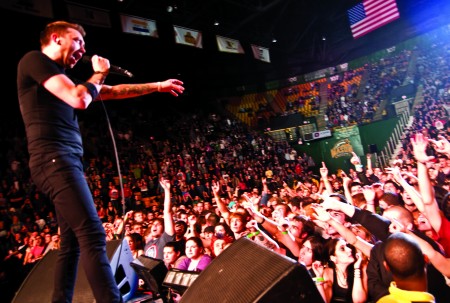Recently released statistics from Mason’s Annual Security Report surprised many when the amount of reported drug arrests spiked dramatically.
Although the numbers for Student Residencies dropped from 41 to 40 from 2010 to 2011, the reported drug arrests for the On-Campus category increased from 77 to 151 and Public Property drug arrests have increased from 34 to 120. However, the numbers alone do not tell a complete story of drug use on Mason’s Fairfax campus.
“Due to a change in the definition of on-campus, we now have to include all parking lots and the patriot center, and other areas that previously had been in the public property category, into the category of on campus,” said Mike Lynch, Chief of Mason Police.
This definitional distinction means that arrests that occur in residential buildings, which are inaccessible to the public, are counted in the same category as parking lots, which are.
This means that drug arrests made from arresting the public are counted in the same category as the student body, which can make the numbers seem worse than they are.
This year, drug arrests from parking lots and the patriot center, which totaled 120, “were tallied in both public property and on campus. Next year, we will probably only list them in On Campus to avoid this confusion,” said Lynch.
Despite this categorical confusion, the definitions do not change the fact that there has been an increase in drug arrests made at Mason.
“There are two big factors that have influenced the increase in drug use on campus,” said Lynch.
The first is the increase in residential living on Mason’s campus.
“We have opened new beds in our dorms. Twelve years ago, when I started, there were roughly 2,300 beds. Now, we have over 6,000. That increase is bound to have effects on the total number of drug arrests each year,” said Lynch.
With an increase in a student population an increase in drug arrests is nearly unavoidable. But drug arrests cannot be solely blamed on a growing student body. Lynch also points to the Patriot Center as a large contributor to on-campus drug arrests.
“We do track those acts booked at the Patriot Center. Often, big name groups come with a following and we can track their experiences from previous venues before they come to Mason,” Lynch said.
This work on the part of the police department the most important factor in the increase of campus-wide drug arrests. Behind every arrest is a police officer that has done the work to try to prevent illegal activity on campus and uphold security standards set by the university.
“The vigorous enforcement on the part of the police has increased arrests,” said Barry Geisler, Patriot Center General Manager.
The actual Patriot Center holds no responsibility for the drug use, but instead it is the crowds they attract.
“Drug use depends on the show,” said Geisler, “For example, this week we have Disney on Ice. We don’t expect much drug use with these crowds.” This is a point that Lynch echoes.
Last March, “Furthur”, an offshoot of the popular Grateful Dead, performed at the Patriot Center. That event ended with nearly 40 drug arrests made by Mason Police.
This event, and others like it, skews the reports at the end of year making it appear as though drug abuse is a larger problem than it is.
“Many, almost all, Patriot Center events are primarily composed of outside community members, not including students,” said Lynch.
Geisler points out that, while the Patriot Center conducts their own security routines based on the show, the majority of arrests are taking place both before an after the show outside the Patriot Center.
“The activity is not occurring inside the Patriot Center,” said Geisler.
Instead, a larger, better prepared police department has worked to make it their mission to do its job more effectively and eradicate problem drug use from campus.
“We now have a bigger police department that is more well equipped to handle the growing student body.”
Apart from the drug arrest numbers, the security report covered categories ranging from murder to liquor law arrests and referrals.
Continuing a consistent trend, Mason reported no murder/non-negligent manslaughter’s or negligent manslaughters. There were a total of eight reported forcible sex offenses, up from five the previous year.
Both liquor laws arrests and liquor laws referrals were down in 2011. Arrests were down to 99 from 111 and referrals were down to 211 from 259, more evidence that work done by the police department is paying off.
Campus burglaries, which are defined as the unlawful entry into a building or structure where the victim does not have to be present, are up from 20 in 2010 to 29 in 2011.
There were zero robberies reported in 2011, which are defined as taking something from someone that has value by utilizing intimidation, force or threat.







Comments